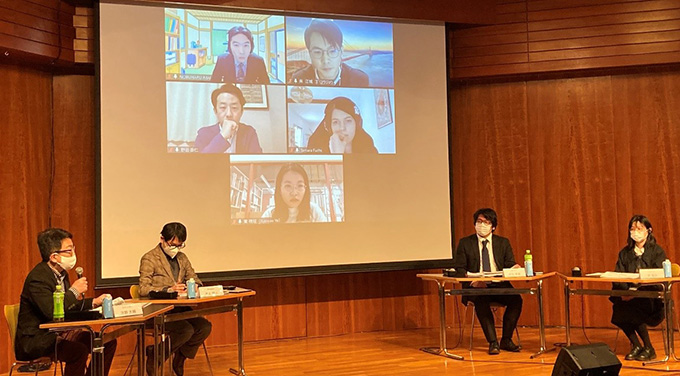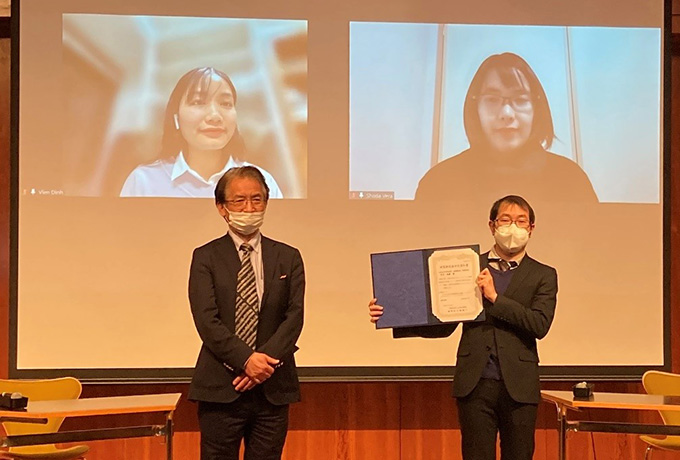The 6th Youth Culture Symposium: Exchange between East and West in Contemporary Culture
The Yamaoka Memorial Foundation hosted the “6th Youth Culture Symposium: Exchange between East and West in Contemporary Culture” on February 16. This year, the symposium was limited to an online event due to the Omicron variant, and a total of 72 people attended.
The symposium was held to provide an opportunity for young researchers funded by the Yamaoka Memorial Foundation to report on their research regarding how contemporary youth culture and lifestyles in Japan and Germany have changed in recent years due to the rapid progress of globalization and information technology, and what developments can be expected in youth cultural exchange between the two countries in the future.
During this year's event, four researchers presented their research about their respective topics: three were young researchers who had received the research grant for “Youth Culture and Lifestyles in Japan and Germany" for fiscal year 2021, and one had received the grant for fiscal year 2020, but his presentation had been postponed due to the Corona pandemic.

The plenary discussion was based on the respective research topics and provided an opportunity for lively debate among the presenters and the international panelists.
Although the symposium was held online, opinions and questions from audience members were incorporated into the discussion, and the exchange of opinions between the presenters and the audience made for a meaningful symposium.

At the end of the symposium, a ceremony was held to award the research grants for fiscal year 2022. One of the three recipients was present at the venue, and Executive Director Yukino of the Yamaoka Memorial Foundation presented him with a research grant certificate and encouraged him with the words: “Please keep doing your best”.

bottom right on the screen: the three recipients of the research grants for fiscal year 2022>
In the audience questionnaire responses, many audience members commented that they had “learned a lot by hearing about subjects that you normally wouldn't pay attention to,” and that the symposium was “an interesting and valuable opportunity.”
<Presentations on research funded in fiscal year 2021>
- Akito Inoue
(Full-time Lecturer, College of Image Arts and Sciences, Ritsumeikan University)
“Comparison of youth culture in Japan and Germany based on the discourse about games”
- Nobuharu Imai
(Adjunct Lecturer at Rikkyo University; Part-time Lecturer at Tokyo Kasei University, Tokyo Polytechnic University, and Otsuma Women's University)
“Comparison of Analog Games in Japan and Germany and Research on Young People's Participation in Games”
- Jiangcheng Wu
(Doctoral Candidate, Graduate School of Education, Kyoto University)
“The Reception of Haruki Murakami's Literature in German and Chinese Online Communities”
- Takehito Noda
(Associate Professor, Faculty of Modern Welfare, Hosei University)
“Environmental History of the Culture of Drinking Spring Water in Japan and Germany”
<Research grant recipients for fiscal year 2022>
- Vera Paola Shoda
Kobe University, Center for Computational Social Science & Research Institute for Economics and Business Administration, Assistant Professor
"Study on young Japanese and German women's self-representations on social media (Instagram)"
- Dinh Thi Thuc Vien
Kyoto University, Graduate School of Agriculture, Division of Natural Resource Economics, PhD Candidate
"The openness of Japanese and German young people to ethnic foods: The case of Vietnamese cuisine"
- Matsumoto Toshiki
Osaka University, Graduate School of Letters Teaching Assistant (Deputy Assistant Professor)
"Changes in the Reception of Takarazuka in Germany: From "Kabuki" to Subculture and Queer Culture”

